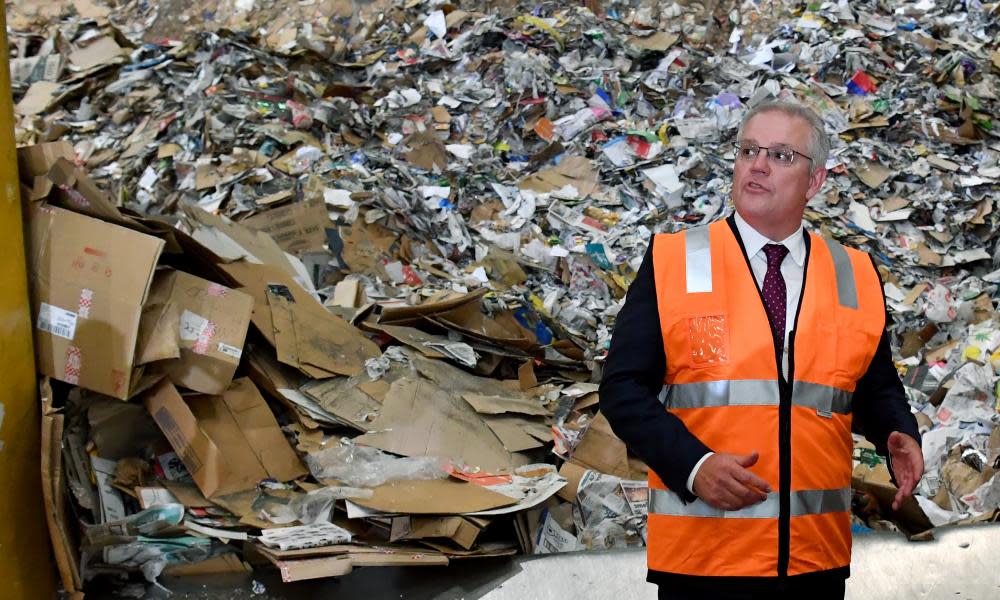Coalition's $100m scheme to fund recycled products has spent no money

A $100m scheme to fund the manufacturing of products from recycled plastics and paper has not used any of its funding, nor supported any initiatives, since it was unveiled by the Morrison government ahead of the 2019 election.
Labor has accused the government of failing to deliver on its recycling and waste commitments after Senate estimates last week heard leaders in charge of the Recycling Investment Fund (Rif) “haven’t entered into any transactions at this point”.
The fund – announced by the prime minister, Scott Morrison, the treasurer, Josh Frydenberg, and the then environment minister, Melissa Price, in May 2019 – committed $100m “to support manufacturing of lower emissions and energy-efficient recycled content products, such as recycled content plastics and paper/pulp”.
According to its website, the government-owned Clean Energy Finance Corporation expected to use the $100m by providing concessional loans of about $10m to “larger-scale commercial and industrial projects” that “use clean energy technologies to support the recycling of waste plastics, paper, glass and tyres”.
Related: Australia's recycling crisis: is the government's $190m on new infrastructure worth it?
Applicants for the fund, like all projects the CEFC invests in, need to be commercial so they can “deliver a positive return for taxpayers”.
However, Ian Learmonth, the chief executive of the CEFC, told Senate estimates last Tuesday that no recycling projects had been approved for loans from the $100m fund.
“There has been a very active pipeline of transactions and some active negotiations with proponents, but we’ve announced nothing at this point,” Learmonth said. “We haven’t entered into any transactions at this point.”
Learmonth said the CEFC was “very active in the space” and has had “more than preliminary” discussions with some potential fund applicants. He said he was “optimistic about doing something in the recycling fund” over the next 12 months.
Simon Every, the corporation’s head of government and stakeholder relations, also rejected the idea that the $190m Recycling Modernisation Fund, announced by the federal government in July this year, was detracting from the Rif because it offered funding as opposed to loans.
Josh Wilson, Labor’s assistant environment spokesman, told Guardian Australia “while the government makes regular and carefully packaged announcements on waste and recycling, in large part, they are not worth the paper they’re printed on”.
Wilson also noted Senate estimates heard the National Product Stewardship Investment Fund – announced alongside the Rif – had made no grants yet, meaning “72% of the prime minister’s much-vaunted $167m” of recycling initiatives announced at the election have “made no difference to Australia’s serious waste crisis some 18 months later”.
Peter Whish-Wilson, the Greens recycling spokesman, told Guardian Australia “given that not a cent has been spent a whole year later, this looks to be yet another empty announceable”.
“It just demonstrates that the government isn’t serious about fixing the waste crisis and building a functional circular economy,” he said.
When Guardian Australia asked the environment minister, Sussan Ley, if she was concerned by the output of the Rif, a spokesman did not answer directly, instead saying “the Morrison government is driving unprecedented investment in waste and recycling and is working closely with industry and non-government organisations to drive lasting change”.
The spokesman also said the $100m Recycling Investment Fund “has a particular focus on large-scale recycling projects which use clean energy technologies”, and rejected the idea the subsequently announced Recycling Modernisation Fund was cannibalising potential applications.
The government has recently been forced into finding new solutions to manage Australia’s waste and recycling, after governments including those of Indonesia and Malaysia announced they would return recycling that had been “contaminated” with unrelated waste.

 Yahoo News
Yahoo News 
